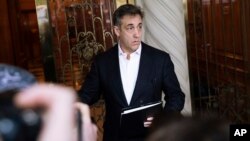Donald Trump’s former lawyer and fixer Michael Cohen is poised to testify Monday before a Manhattan grand jury investigating hush-money payments he arranged and made on the former president’s behalf.
Cohen's impending grand jury appearance was confirmed by two people familiar with the matter who were not authorized to speak publicly about grand jury proceedings and did so on condition of anonymity.
Cohen's closed-door testimony is coming at a critical time as the Manhattan district attorney's office closes in on a decision on whether to seek charges against Trump.
A Trump loyalist turned adversary, Cohen is likely to provide critical details about whatever involvement the Republican presidential candidate may have had in the payments, made in the final weeks of the 2016 campaign, to two women who alleged affairs with him.
Cohen has given prosecutors evidence, including voice recordings of conversations he had with a lawyer for one of the women, as well as emails and text messages. He also has recordings of a conversation in which he and Trump spoke about an arrangement to pay the other woman through the supermarket tabloid the National Enquirer.
Prosecutors appear to be looking at whether Trump committed crimes in how the payments were made or how they were accounted for internally at Trump’s company, the Trump Organization.
One possible charge would be falsifying business records, a misdemeanor unless prosecutors could prove it was done to conceal another crime. No former U.S. president has ever been charged with a crime.
Trump has denied the affairs and has said he did nothing wrong. Prosecutors have invited him to testify before the grand jury, and he has the right to testify under New York law. However, legal experts say he is unlikely to do so because it wouldn’t benefit his defense and he’d have to give up a cloak of immunity that’s automatically granted to grand jury witnesses under state law.
Cohen served prison time after pleading guilty in 2018 to federal charges, including campaign finance violations, for arranging the payouts to porn actor Stormy Daniels and model Karen McDougal to keep them from going public. He has also been disbarred.
Trump’s lawyers could point to those factors in an attempt to undermine Cohen's credibility, if the former president is charged and Cohen ends up testifying at trial.
Cohen has been meeting regularly with Manhattan prosecutors in recent weeks, including a daylong session Friday to prepare for his grand jury appearance.
The panel has been hearing evidence since January in what Manhattan District Attorney Alvin Bragg has called the “next chapter” of his office’s yearslong Trump investigation. But the hush-money payments — perhaps the most salacious of the avenues of inquiry into Trump — are well-trodden ground.
Federal prosecutors and Bragg's predecessor in the D.A.'s office, Cyrus Vance Jr., each scrutinized the payments but didn't charge Trump.
Cohen declined to comment to reporters as he left the meeting, saying he’d be “taking a little bit of time now to stay silent and allow the D.A. build their case.”
The Manhattan district attorney’s office also declined to comment.
Trump continued to lash out at the probe on social media Friday, calling the case a “Scam, Injustice, Mockery, and Complete and Total Weaponization of Law Enforcement in order to affect a Presidential Election!”
Cohen paid Daniels $130,000 through his own company and was then reimbursed by Trump, whose company logged the reimbursements as “legal expenses.”
McDougal’s $150,000 payment was made through the publisher of the National Enquirer, which squelched her story in a journalistically dubious practice known as “catch-and-kill.”
According to federal prosecutors who charged Cohen, the Trump Organization then “grossed up” Cohen’s reimbursement for the Daniels payment for “tax purposes," giving him $360,000 plus a $60,000 bonus, for a total of $420,000.





